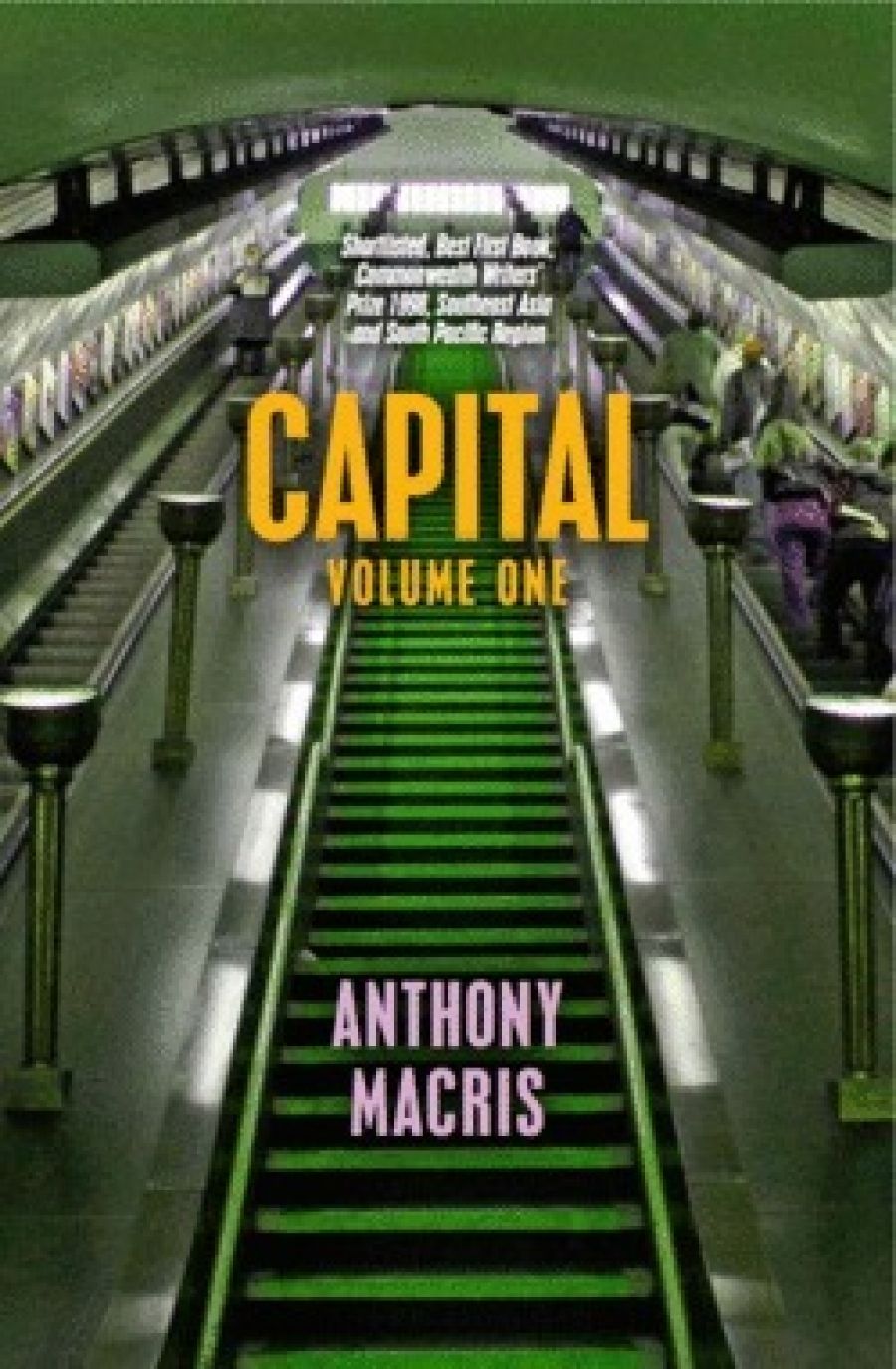
- Free Article: No
- Contents Category: Fiction
- Review Article: Yes
- Article Title: Comic Bleakness
- Online Only: No
- Custom Highlight Text:
The point of return in this highly moveable associative novel is the London Underground, not as an instance of efficiency or even the most modest and individual progression, but rather as a static enclosure where creatures and people are delayed, starved, balked, pained by the straps or handles of their baggage and, most overwhelmingly, alone.
- Book 1 Title: Capital, Volume One
- Book 1 Biblio: Allen & Unwin, $16.95 pb, 228 pp
- Book 1 Readings Link: booktopia.kh4ffx.net/mgB0vM
The writing is sombre, detailed, impersonal, and often magnificent. There is a muteness, a self-enclosure in the writing which produces an effect of utter interiority, of unshared watchfulness. A man ‘misses having something to read, his mind feeling as if it had been cast adrift and left to feed senselessly on itself’. Appetite in this novel is cannibalistic, as in the self-consuming mind; or devastatingly limited, as in the man whose decision to buy a bottle of Lucozade fills him with the relief of having ‘at last found an achievable object’; or repellent, as in the mouse which works its way through the detailed ingredients of a ‘fresh starburst of vomit’; or sadly calculating, like the newly pregnant woman whose sexual timing and technique has been organised to suit conception rather than pleasure. Musical pleasure is especially equivocal, as the narrator searches the second-hand record shop for his own discarded collection, tiredly renouncing copies of albums he once knew, or buying without much enthusiasm. This is not a constructive restitution of the past.
The novel is deeply concerned with the past. Spliced between sequences in the London Underground, the narrator describes himself walking to school; getting a completely undesirable job as a pancake waiter; listening to an anti-communist diatribe; half-deflecting a political discussion with foreign students; evading a masturbator in a cinema screening Jonathon Livingstone Seagull; witnessing petty cruelties in the public service; enduring a pretentious student party; driving into the city with his father and brother when he was a child and, as I’ve said, ‘visiting’ his old record collection.
I’ve compiled this list to give an idea of the movement of the novel; the way it plays with fragmentation while retaining strong continuity, just as it plays with the idea of progress, including versions of Mao and Stalin, while circling back, in a closed and repetitive and therefore entirely appropriate way, to the London Underground. The past, in terms of the individual and in terms of larger political movements, moves towards stasis, irritation, or disappointment. In the first chapter a man trying to read the time from other people’s watches is at first frustrated, then conclusively dismayed, as someone else’s ‘excellent’ watch confirms that he has missed his chance to meet a friend. Time has nothing to do with the fulfilment of the most ordinary satisfactions.
None of this is cheerful, but in fact the novel itself is extremely clever and funny. There is something black, tense, and deliberately bathetic about the pregnant mouse or the Lucozade bottle which is tracked about the Underground. The flickering, moveable London of Mrs Dalloway is reduced to glimpsed slogans, advertisements, and general detritus. There is no Westminster or Big Ben here. In the spliced sequences the humour is much less dry and tense and, given what has been established in the Underground, less appealing to me, but perhaps the novel needs the variety of these lighter sections. There are easy targets here: paranoid denunciations of Communism; the enthusiasms of Jonathon Livingstone Seagull; excesses in the career of David Bowie; an enactment or repetition of Munch’s ‘The Scream’. The ironies in the Underground are much more complicated and engrossing. One of my favourite passages has to do with an artist who moves to Birmingham to escape paintings inspired by ‘internal emotional states’ as opposed to ‘public, social issues’, only to find his art caught up in his emotional response to these larger concerns. His last painting, executed ‘in a cold, impotent rage,’ is an ‘enormous object – filthy and stinking of a mixture of odours, from the eucalyptus of gums turps and the faint reek of (cat? human?) urine to the drier smells of soot, sand and earth.’ As this painting is hauled through the Underground, part of the surface dislodges and flies into the eye of the fastidious stylish woman who has been so successful in organising her pregnancy. This literal visual irritation of the potential viewer and the huge gulf between artistic objectives and public preoccupations is wonderfully funny. So is the earlier, unspoken misunderstanding between the backpacker who thinks of an elderly woman as maternal and prepares to ask her for money and the woman herself, furious about being jostled by his pack.
There is a rare skill and confidence in this novel. It obviously has to do with postmodernist tactics of irony, pastiche, and self-referentiality, but all this is done with unusually intelligent bleakness, humour, and observation.


Comments powered by CComment